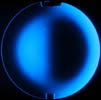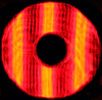June 28,
2012: My Venus transit experience and a side trip
Having
worked too many hours in the first half of 2012, I needed a vacation.
To get the time away that I wanted, and to get to a later event on
time, I realized that I would need to view the Venus transit from Texas, while on vacation there to visit friends and
take waterski and wakeboard lessons. I like this
type of vacation because I meet people, learn things, and get a great workout instead
of the typical vacation over-eating.
I
used my 25x100mm binoculars to watch the 2004 transit of Venus, but I
didn't really want to lug the big binos, tripod, and mounting bracket
on my vacation that had several other stops. I settled on taking
my 8" f/5.6 travel scope and a telephoto lens for my camera to record
the event as best I could. None of these took up much room in my
car, which made the vacation more enjoyable too.
So,
I packed my 8" travel scope, which had
been neglected for some time, and for my camera and heavy-duty tripod. I
made filters for both from some Baader film that I had on hand, and
worked very hard in the shop to finish projects that needed to be done
before I left.
After visiting a friend in St. Louis, I drove to
Oklahoma on Sunday, and drove the remaining few hours on
Monday morning. The telescope was assembled that evening, and I awaited
the transit beginning at about 5pm local time on Tuesday, following a good day of skiing.
Clouds
increased on Tuesday afternoon, and a thunderstorm had formed southwest of my
location. It was moving southeast, luckily, and it became clear that it
would miss my location, so I set up my equipment, as seen in the photo below.
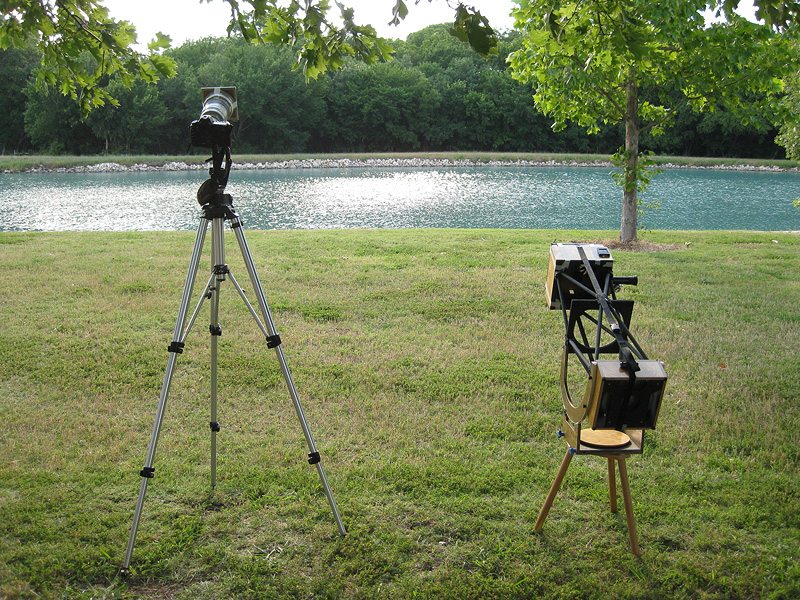
My location was very peaceful compared to the huge crowds that my local club, the Champaign Urbana Astronomical Society,
was experiencing back home. I called some of the members during the
transit, and I was told that the skies were clear and that there were
so many people there that the police were directing traffic! Here is a link to a photo album for that extremely popular event.
I
was a little sad to miss the club event, but then again I didn't have
to fight for time viewing through my own telescope! I only had to
compete for eyepiece time with my friend Erik, who was rather reluctant
to use the travel scope despite its very safe, well-attached filter, so
I basically had it to myself the whole time. Later on I even
aimed it away from the sun so that I could look up trough the tube,
through the very well attached filter alone, so I could glimpse the
spec of Venus on the disk of the sun with my unaided eye.
As transit time approached, it became clear that the sun would be obscured for first contact. The
upside of the nearby storm was that I was able to get some neat images
of a
partly obscured sun with Venus taking a little nip out of it. This was one of the first shots that I took.
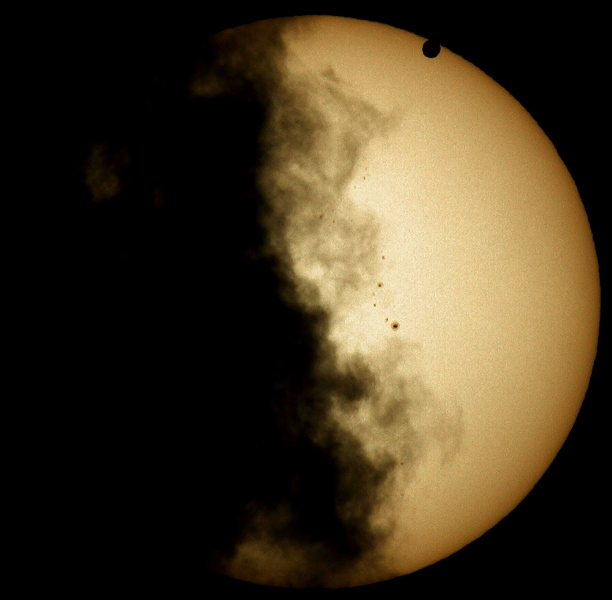
All images of the
sun were shot with a Canon 5D Mark II and 300mm lens with
a 2X attachment, for an effective 600mm focal length. The filter was the
visual Baader material, which seemed to work fine. I know a
photographic filter material is available with a bit higher
transmission, but I didn't have an issue keeping the shutter speed
fairly fast, typically under 1/500 s. Focus was adjusted carefully
throughout the transit using the live view function on the camera.
Slight adjustments paid big dividends.
I
was very pleased with the sunpot and granulation detail that I captured
with a simple, though very good quality, camera lens and no tracking
at all - just a tripod. I kept shooting as the
transit progressed, of course, and below are some of those images.
I also was taking a look through my travel scope periodically,
and I was rewarded with a highly detailed view of the granulation and
sunspots, some light areas at the bottom of the sun's disk, and
a sharp outline of Venus.
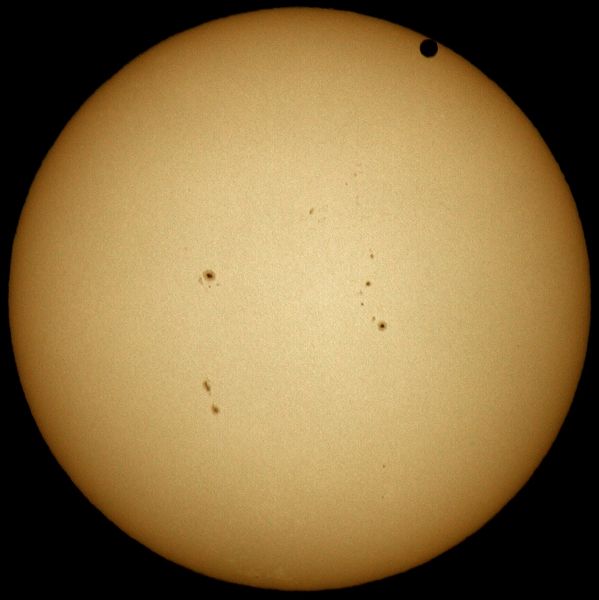
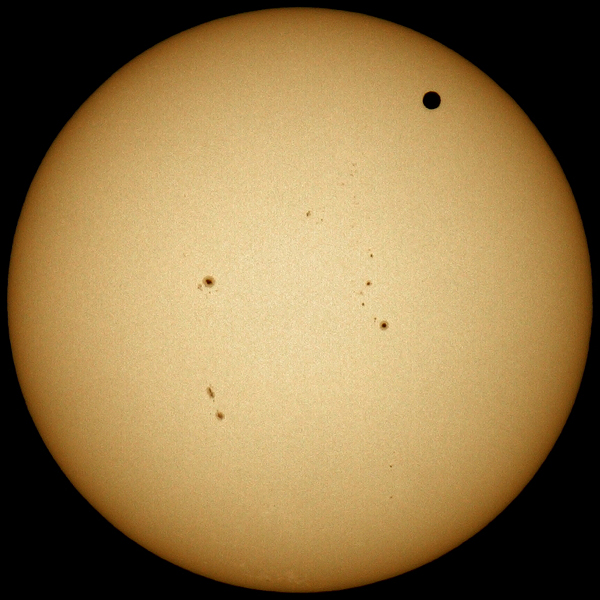
This might be the best image of the lot:
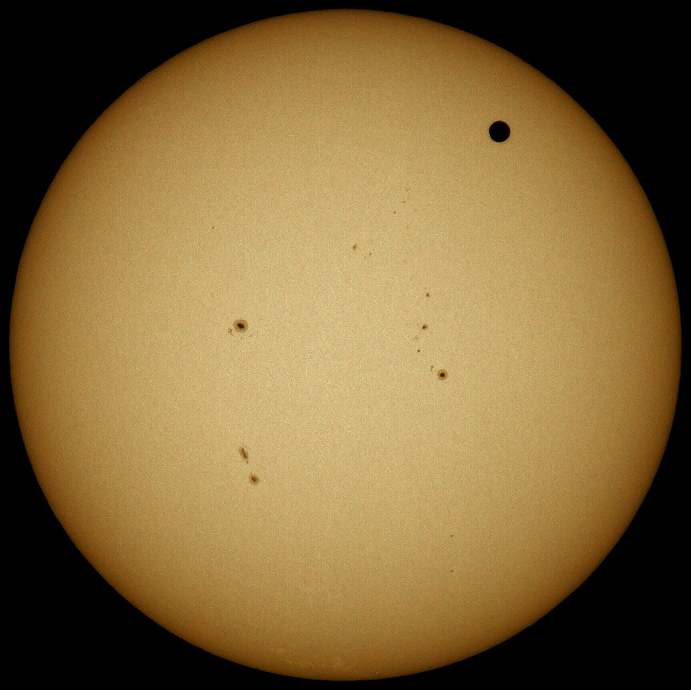
The
transit continued in mostly clear skies, with only occasional
clouds blocking the sun for short periods of time..... until the sun started
to get near the horizon. There it encountered some thick clouds
associated with more distant storms.
So, about 45 minutes before
sunset I packed it in and Erik and I headed off to celebrate with some delicious
Tex-Mex food at a local restaurant. Here's my camera after taking
some of my last, cloud-obscured shots.
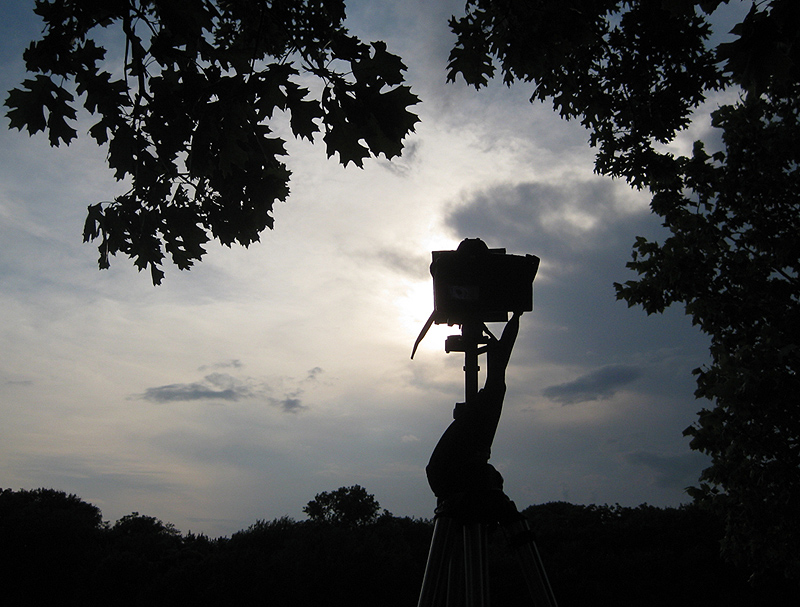
I
wasn't disappointed by the clouds - I had seen enough and shot enough
images to satisfy myself, and I was getting hungry! Overall, in addition to some good skiing,
it was a relaxing and fun astronomy day, and I learned that I can capture some
good quality images of the sun with a fairly simple setup.
I
think I'll definitely do more solar observing in the future. I
saw the 2004 transit through my 100mm binoculars, and since then I've
done very little solar observing. That needs to change, because
the binoculars provide an outstanding view with Baader film filters.
After
Texas, I headed east for some other vacation activities.
Finishing up near Charlotte, NC, I discovered that a relatively
new client, one which materialized during my vacation, would be almost
on my way home. The Blue Ridge Astronomy Group, in cooperation
with Mayland Community College, was putting together a new observatory which will
feature a 34" f/3.6 Starstructure telescope using my optics. I set
my GPS for Burnsville, NC in order to meet up with a club member named
Bob.
Bob had a big part in bringing the new telescope to
Yancey County, NC, and he also makes sundials that tell time to an
accuracy of about one minute. Here he is with one of his
creations, wearing the appropriate T-shirt.
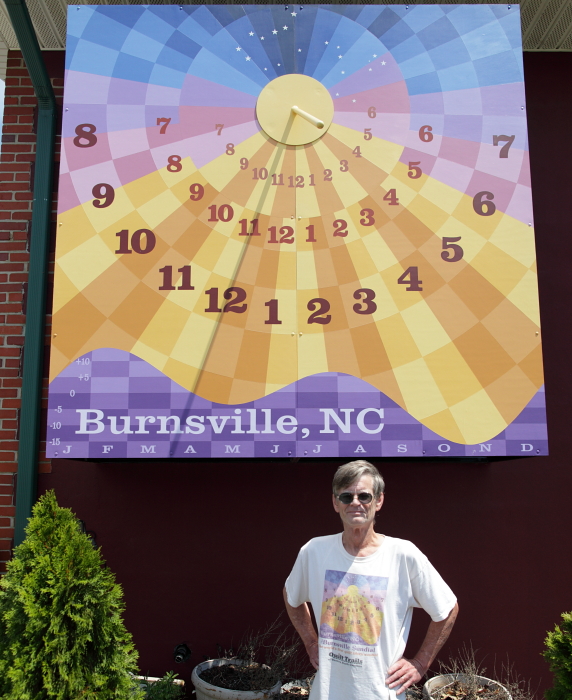
The time of "high noon" on the sundial plus about three minutes of
correction (given by the top of the purple curve, as a function of the
date) agrees nicely with the date stamp of my camera. Nice work Bob.
I hope to
return when the telescope is installed, and I really enjoyed seeing the
surrounding mountains and ridges as I drove over and through them.
Here is a last photo of part of Burnsville, showing some of the
surrounding hills. The sundial is visible behind the speed limit sign, on the side of the red building.
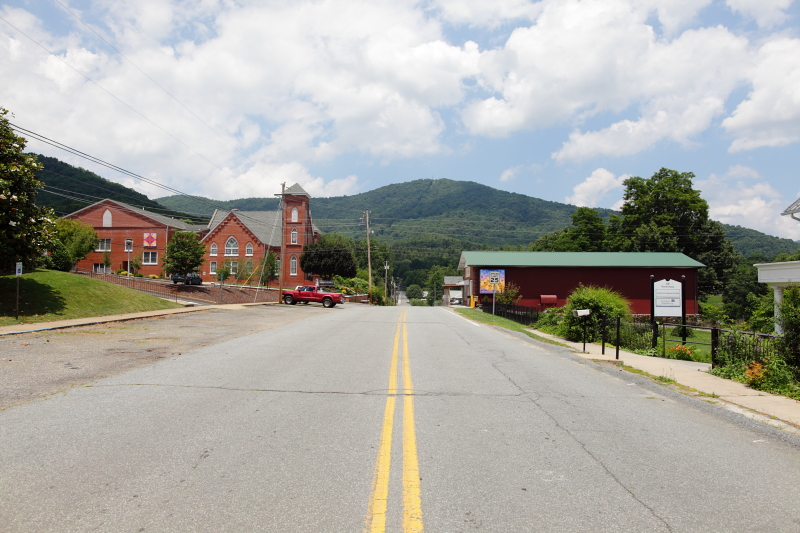
Please check back for future installements of "In
the Shop".
Mike
Lockwood
Lockwood Custom Optics
All images and text copyright Michael E. Lockwood, all rights reserved.
